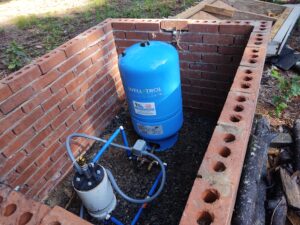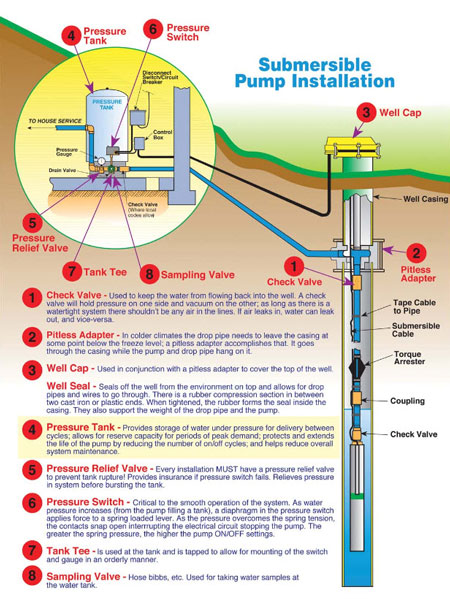Seamless Well Pump Replacement: Recovering Your Water with Accuracy
Seamless Well Pump Replacement: Recovering Your Water with Accuracy
Blog Article
Understanding the Key Parts of Effective Water Filtering Solutions

Value of Water Filtration Equipment
Water filtration systems play a crucial role in making sure access to tidy and safe drinking water by properly eliminating contaminants and pollutants. These systems are crucial in dealing with the expanding concerns over water high quality and the prospective wellness threats related to consuming polluted water. By making use of various purification mechanisms such as reverse osmosis, turned on carbon, and UV sanitation, water filtration systems can effectively eliminate hazardous compounds like microorganisms, infections, hefty steels, and chemicals from the supply of water.
Additionally, water purification systems assist to improve the preference and odor of water by removing chlorine, sediments, and various other contaminants that can influence its quality. Water Softeners. This enhancement in water top quality not just makes it a lot more tasty but additionally urges people to consume an adequate quantity of water daily, promoting better hydration and general health
Sorts Of Filtering Elements

Physical filters are created to physically strain out impurities from the water. These filters can be constructed from products like ceramic, carbon, or even sand, and they work by capturing particles bigger than the filter's pores as water travels through.
Chemical filters use numerous chemical processes to get rid of contaminants from the water. Examples include triggered carbon filters, which adsorb impurities, and turn around osmosis membranes, which make use of stress to different pollutants from the water.
Organic filters utilize living organisms like algae or bacteria to damage down raw material and toxins in the water. These filters are commonly used in wastewater treatment plants or all-natural water purification systems.
Recognizing the various sorts of filtering parts is vital for picking one of the most appropriate water filtration system for details purification demands.
Function of Debris Filters
Debris filters play a crucial duty in water filtration systems by successfully catching solid bits put on hold in the water. These filters are generally the first line of protection in a purification system, getting rid of bigger bits such as sand, silt, dirt, and rust before the water moves with finer filtering phases. By important site trapping these debris, the filters prevent them from reaching downstream components, thus expanding the life-span and efficiency of the whole system.
The function of sediment filters is important in keeping water quality and securing sensitive tools you can look here from damage brought on by debris. Additionally, by eliminating visible bits, debris filters boost the clarity and taste of the water. On a regular basis replacing or cleaning up debris filters is necessary to make sure optimal performance. Ignoring this upkeep can cause obstructing, lowered water flow, and endangered filtering efficiency. Generally, debris filters are vital components that contribute substantially to the performance of water filtration systems.
Role of Triggered Carbon Filters
Playing an essential function in water filtering systems, triggered carbon filters are crucial in getting rid of contaminations and contaminants from the water supply. As water passes through the filter, the activated carbon brings in and holds onto the contaminations, making sure that the water that comes out on the various other side is cleaner and more secure for intake.
Turned on carbon filters are extremely efficient at enhancing the taste and odor of water by minimizing chemicals that can impact its top quality. They are additionally with the ability of removing specific hefty metals like lead and mercury. In addition, these filters can assist avoid the build-up of microorganisms and algae in water, more enhancing its overall top quality. As a result of their convenience and dependability, activated carbon filters are a vital part in making sure that water is purified to the highest possible requirements prior to getting to consumers.
Recognizing Reverse Osmosis Equipments
Reverse osmosis systems are innovative water filtration systems that utilize a sophisticated procedure to remove impurities and pollutants from drinking water. These systems work by using stress to the water, compeling it via a semi-permeable membrane layer. This membrane works as a barrier, enabling only pure water molecules to pass through, while blocking larger molecules such as minerals, chemicals, and various other contaminations. Because of this, the water that comes out beyond is considerably cleaner and much safer for intake.
One secret benefit of reverse osmosis systems is their ability to eliminate a large range of pollutants, consisting of heavy steels, liquified solids, microorganisms, and viruses. This makes them very efficient in boosting the general high quality and security of alcohol consumption water. In addition, reverse osmosis systems are reasonably low-maintenance and can be set up under the sink or in a main filtering system, giving convenient accessibility to tidy water throughout the home. Generally, recognizing just how reverse osmosis systems work can assist individuals make informed decisions about their water filtering demands.
Conclusion
To conclude, effective water purification systems are crucial for read what he said ensuring clean and safe drinking water. The essential elements of these systems include sediment filters, triggered carbon filters, and reverse osmosis systems. By comprehending the function and role of each element, individuals can make informed choices when choosing a water filtering system. It is necessary to prioritize the quality of water in order to advertise general health and health.
Water purification systems play a vital duty in making sure accessibility to clean and secure alcohol consumption water by efficiently getting rid of impurities and pollutants. By using numerous filtration systems such as reverse osmosis, activated carbon, and UV sterilization, water filtration systems can efficiently remove dangerous materials like microorganisms, infections, heavy metals, and chemicals from the water supply.
Sediment filters play a critical duty in water filtration systems by effectively catching solid particles put on hold in the water (Pump repairs & installation).Playing an important role in water filtration systems, activated carbon filters are important in removing impurities and impurities from the water supply.Reverse osmosis systems are advanced water filtration systems that use an advanced process to get rid of impurities and contaminations from drinking water
Report this page